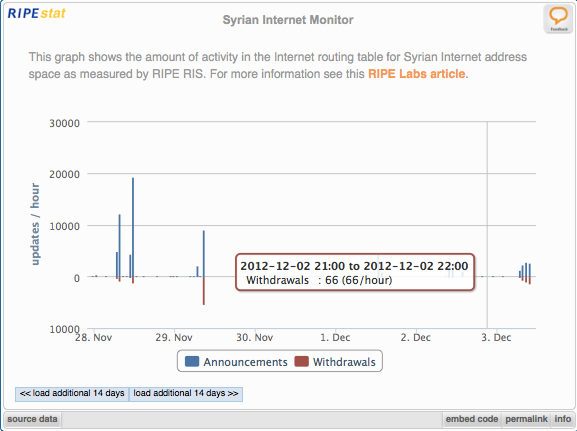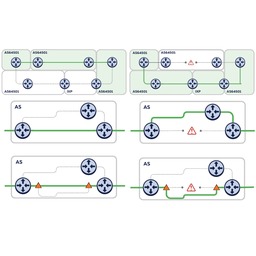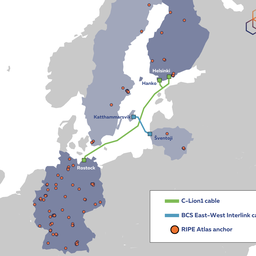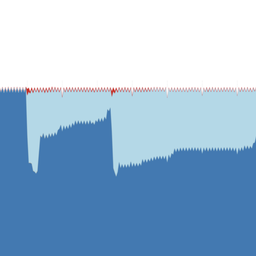The RIPE NCC developed a RIPEstat widget that provides a near real-time feed of what BGP updates and withdrawals we see from Syrian IP address space.
As reported in the news, Syria's been offline since Thursday, 29 November at 10:26 UTC (12:26 in Damascus). The vast majority of IP address blocks allocated or assigned to organisations in Syria have become unreachable.
The RIPE NCC's service region includes Syria, where we have 14 members.
Fortunately, Syria's (lack of) Internet is being closely monitored by many organisations that are sure to provide timely and interesting updates. The RIPE NCC now contributes to this monitoring with a unique widget adapted from the current RIPEstat Border Gateway Protocol (BGP) update activity widget.
This new Syria Internet Monitor widget provides a near real-time feed of what BGP updates and withdrawals we see from Syrian IP address space, so anybody can detect if there are any signs of (parts) of the Syrian Internet coming back online. You can embed this live monitoring on your own website as shown below.
RIPEstat provides users with detailed information about a specific Internet number resource, like an IP address or AS number. Our team has been busy updating its BGP update activity widget to show the aggregate for all address space allocated or assigned to organisations in Syria.
BGP updates are the Internet equivalent to "gossip", and, continuing that analogy, all the players in the Internet ecosystem (called Autonomous Systems) gossip to their neighbours about how to best reach particular pieces of the Internet (called prefixes). That means you announce how to best reach a particular prefix. If you don't know how to reach a prefix anymore, you also tell your neighbours, i.e. you withdraw this prefix. Once you learn from your neighbour's gossip how to reach a prefix, you memorise it until your neighbour updates you on their view of how to reach this prefix (which they got from their neighbours, etc.).
In RIPEstat we show BGP update activity for individual prefixes as we see it in the RIPE Routing Information System (RIS) , both announcements and withdrawals. The new Syria Internet Monitor widget shows the aggregate of updates for all address space allocated or assigned to organisations in Syria.
As of the publication of this article, the widget shows no recent activity, but when something happens with any Syrian address space in BGP, it will show on this graph as spikes of BGP announcements, i.e. the amount of "gossip" going on about the reachability of address space in use in Syria. We don't put humans in the loop of assessing if this is a false alarm or not, so there is a slight chance that any sign of life on the Syrian Internet could of course be a false alarm. Very similar to real-life gossip actually.
If you want to monitor the Syrian Internet blackout on your own web page, here is the HTML code to embed the RIPEstat widget:
<script src="https://stat.ripe.net/widgets/widget_api.js"></script>
<div class="statwdgtauto">
<script>ripestat.init("syria-monitor",{},null,{"show_controls":"yes","disable":[]})</script>
</div>




Comments 0
The comments section is closed for articles published more than a year ago. If you'd like to inform us of any issues, please contact us.